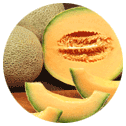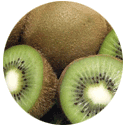Honey Dew Health Benefits And Nutrition Values
Honeydew is the American name for White Antibes cultivar which has been grown for many years in southern France and Algeria.A honeydew has a round to slightly oval shape, typically 15–22 cm (5.9–8.7 in) long. It generally ranges in weight from 1.8 to 3.6 kg (4.0 to 7.9 lb). The flesh is usually pale green in color, the peel ranges from greenish to yellow.Honeydew has seeds. Honeydew's thick, juicy, sweet flesh is often eaten for dessert, and is commonly found in supermarkets across the world. Honeydew melons are an excellent source of vitamin C and a good source of potassium.

Nutrient |
Amounts/Selected Serving |
DV% |
|---|---|---|
Calcium |
10.6mg |
1% |
Iron |
0.3mg |
2% |
Magnesium |
17.7mg |
4% |
Phosphorus |
19.5mg |
2% |
Potassium |
404mg
|
12% |
Sodium |
31.9mg |
1% |
Zinc |
0.2mg |
1% |
Copper |
0.0mg |
2% |
Manganese |
0.0mg |
2% |
Selenium |
1.2mcg |
2% |
Fluoride |
~ |
Nutrients |
Amounts/Selected Serving |
DV% |
|---|---|---|
TotalCalories |
63.7(267 kJ)
|
8% |
Carbs |
58.4(245 kJ) |
|
Fat |
2.1(8.8 kJ) |
|
Protein |
3.2(13.4 kJ) |
|
Alcohol |
0.0(0.0 kJ) |
Nutrients |
Amounts/Selected Serving |
DV% |
|---|---|---|
Protein |
1g |
2% |
Nutrients |
Amounts/Selected Serving |
DV% |
|---|---|---|
Fat |
0.2g |
1% |
Saturated Fat |
0.1g |
1% |
Monounsaturated fat |
0.0g |
|
Polysaturated Fat |
0.1g |
|
| trans fatty acids |
~ |
|
transmonoenoicfattyacids |
~ |
|
trans-polyenoicfattyacids |
~ |
|
Omega-3 fatty acids |
58.4mg
|
|
Omega-6 fatty acids |
46mg |
Nutrient |
Amounts/Selected Serving |
DV% |
|---|---|---|
Vitamin A |
88.5IU1 |
2% |
Vitamin B6 |
0.2mg |
8% |
Vitamin B12 |
0.0 mcg |
0% |
Vitamin C |
11.1mg |
53% |
`Vitamin D |
~ |
~ |
Vitamin D3 |
0.0mg |
0% |
Vitamin E |
0.0mg |
0% |
Vitamin K |
5.1mcg
|
6% |
Thiamin |
0.1mg |
4% |
Riboflavin |
0.0mg |
1% |
Niacin |
0.7mg |
4% |
Pantothenic |
0.3mg |
3% |
Choline |
13.5mg |
|
Betaine |
~ |
|
Folate |
33.6mcg |
8% |
Nutrients |
Amounts/Selected Serving |
DV% |
|---|---|---|
carbohydrates |
16.1g
|
13% |
Dietary Fiber |
1.4g |
11% |
Starch |
~ |
|
Sugars |
14.4g |
Nutrients |
Amounts/Selected Serving |
DV% |
|---|---|---|
Cholesterol |
0.0g |
0% |
Phytosterols |
~ |
~ |
Nutrients |
Amounts/Selected Serving |
DV% |
|---|---|---|
Alcohol |
0.0g |
|
Water |
159g |
|
Ash |
0.7g
|
|
Caffeine |
0.0mg |
|
Theobromine |
0.0mg |
- SKIN
- BLOOD PRESSURE
- FOR BABIES
Honeydew melon is rich in source of vitamin C an antioxidant vitamin that helps to boost levels of collagen the protein that gives skin its youth and firmness Health Benefits of Honeydew Melon
Honeydew is an excellent source of potassium that plays an important role in controlling blood pressure and acts as a host of other critical body functions. Potassium is required by every cell in the human body and honeydew melon is a tasty and natural way to supplement with potassium.
Honeydew is abundant with vitamins and minerals, a good solution for a growing baby. Honeydew melon is stuffed with vitamin A, beta carotene, luteine and zeaxanthin which ensure strong vision and smooth skin to the growing baby. Calcium from the melon helps strengthen enamel and bones of those. Babies have weak immune system as compared to adults. Antioxidants with the melon help strengthen the condition fighting capability thereby assist in preventing diseases.
- PREGNANCY WOMEN
- AIDS VISION
Mothers should consume healthy fruits and vegetables which offer a substantial amount of antioxidants, nutrients and fiber. The male body's defence mechanism of any women that are pregnant is pretty weaker. Vitamins, minerals and antioxidants from honeydew melon can strengthen the immunity technique of the mother along with the fetus. Honeydew melon is rich in folate which promotes rapid division of your latest cells
This fruit contains Vitamin A, a powerful antioxidant which is beneficial for vision. The vitamin is also known for maintaining the health of the skin and the mucous membranes and for boost up the function of the immune system.
PERSON WHOM MAY NOT CONSUME HONEY DEW
- WEIGHT GAIN
If you're watching your carbohydrate intake, don't overdo the honeydew since it contains fourteen grams of natural sugar per cup. Enjoy its sweetness as a treat – in lieu of a less healthy dessert.















